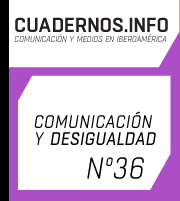Desigualdad comunicativa en el repertorio discursivo de la acción colectiva: El caso de #YoSoy132
DOI:
https://doi.org/10.7764/cdi.36.742Palabras clave:
Desigualdad comunicativa, democratización, concentración mediática, acción colectiva, redes socialesResumen
Este artículo analiza cómo la desigualdad comunicativa media el discurso vinculado a la acción colectiva. A partir de un análisis del caso #YoSoy132, en México (2012), se describe cómo, en un contexto caracterizado por la alta concentración mediática y una singular articulación entre sistema comunicativo dominante y partidos políticos hegemónicos, la democratización de la comunicación deviene una demanda fundamental. Se muestra cómo #YoSoy132 establece vínculos discursivos importantes entre desigualdad comunicativa y desigualdad social en general. Se considera las redes sociales digitales como un recurso central para superar un orden comunicativo desigual, pero también se identifican ciertos desafíos y riesgos asociados al uso de las mismas y a la centralidad de la dimensión comunicativa. Se concluye que la desigualdad comunicativa resulta multidimensional y que su centralidad en el repertorio discursivo del movimiento social #YoSoy132 tiene consecuencias significativas para la acción colectiva y para la propia continuidad del movimiento.















